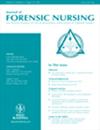韩国杀害亲密伴侣女性的文献综述
IF 0.9
4区 医学
Q3 CRIMINOLOGY & PENOLOGY
引用次数: 1
摘要
摘要背景亲密伴侣杀害女性(IPF)是在亲密关系中对女性实施的一种严重的暴力行为。本综合文献综述的目的是确定韩国IPF的研究。方法在PubMed、CINAHL、PsycINFO、MEDLINE、SocINDEX和RISS(韩国学术在线数据库)六个数据库中进行网络文献检索。由于研究结果数量有限,谷歌学者被用来寻找更多的研究。结果筛选出9篇文章。没有从医疗保健的角度对韩国的IPF进行研究。这些研究主要是为了了解案件的特点和肇事者。通过将生态学模型应用于这些研究,确定了个人、关系、社区和社会层面的风险因素。尽管这些研究表明,社会层面的风险因素——韩国文化、政策和法律——对杀害女性有相当大的影响,但尚未提出明确的解决方案。结论必须从女性社会的角度了解韩国的IPF,以促进亲密伴侣暴力受害者的暴力预防和康复。本文章由计算机程序翻译,如有差异,请以英文原文为准。
Intimate Partner Femicide in South Korea: An Integrative Review of the Literature
ABSTRACT Background Intimate partner femicide (IPF) is a severe form of violence perpetrated against women in intimate relationships. The purpose of this integrative literature review was to identify studies of IPF in South Korea. Methods A web-based literature search was performed in six databases: PubMed, CINAHL, PsycINFO, MEDLINE, SocINDEX, and RISS (Korean academic online database). Because of the limited number of findings, Google Scholar was used to find additional studies. Results Nine articles were selected. There were no studies of IPF in South Korea utilizing a healthcare perspective. The studies were primarily designed to understand the characteristics of the cases and the perpetrators. Through the application of the ecological model to these studies, risk factors at the individual, relationship, community, and societal levels were identified. Although these studies identified that risk factors at the societal level—Korean culture, policy, and law—have a considerable influence on femicide, a clear solution is not proposed. Conclusion It is imperative to understand IPF in South Korea from a female societal perspective to facilitate violence prevention and recovery for those experiencing intimate partner violence.
求助全文
通过发布文献求助,成功后即可免费获取论文全文。
去求助
来源期刊

Journal of Forensic Nursing
NURSING-
CiteScore
1.50
自引率
10.00%
发文量
120
期刊介绍:
The Journal of Forensic Nursing (JFN) the official journal of the International Association of Forensic Nurses, is a groundbreaking publication that addresses health care issues that transcend health and legal systems by articulating nursing’s response to violence. The journal features empirical studies, review and theoretical articles, methodological and concept papers, and case reports that address the provision of care to victims and perpetrators of violence, trauma, and abuse. Topics include interpersonal violence (sexual assault, abuse, intimate partner violence); death investigation; legal and ethical issues; forensic mental health nursing; correctional nursing; and emergency and trauma nursing.
 求助内容:
求助内容: 应助结果提醒方式:
应助结果提醒方式:


